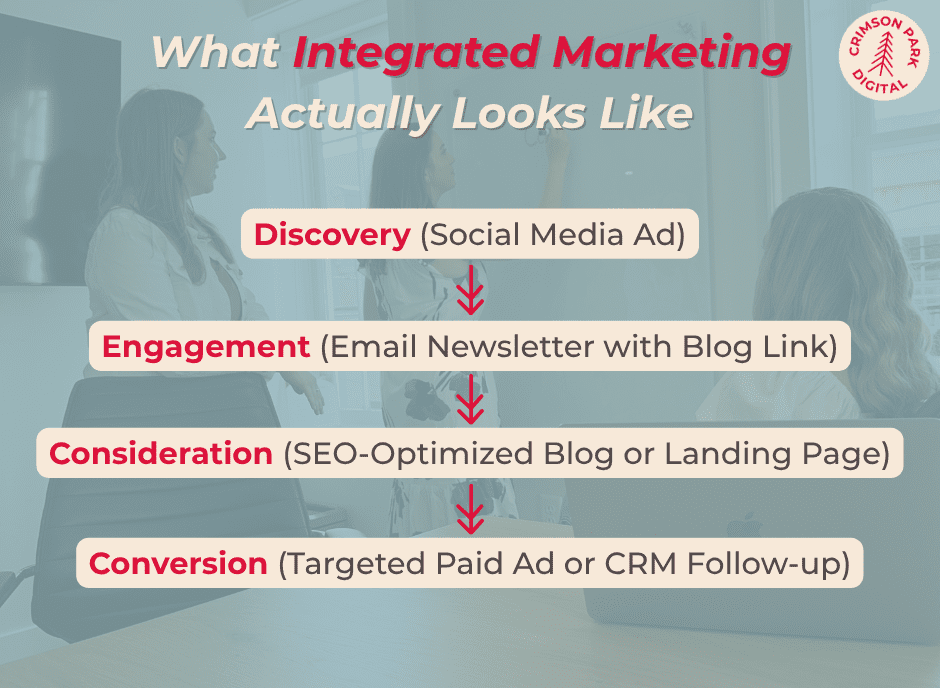When Marketing Lives in Silos, Here’s What Goes Wrong
1. You confuse your audience.
Imagine seeing a playful Instagram post about a new SaaS product, then clicking into your email and getting a serious, corporate message about the same thing. One’s a bit cheeky, while the other sounds like a lawyer wrote it. That inconsistency? It chips away at trust. Your audience doesn’t know which voice to believe, so they stop listening altogether.

2. You waste time and money.
Let’s say two teams are working on the same promo. One is drafting emails, while the other is building out paid ads. However, because they’re not talking, they duplicate work, miss timing opportunities, or worse, launch campaigns that step on each other’s toes. That’s a whole lot of budget being burned with very little to show for it.
3. You miss easy wins.
Your customer service team is hearing gold from customers. Your SEO team has insights into search trends. Your PPC strategist knows what language gets clicks. But if no one is comparing notes, that valuable intel doesn’t make it into your content or campaigns. Missed insights = missed conversions.
4. Creativity hits a wall.
When teams stay in their own lanes, they’re less likely to bounce ideas off each other. Cross-pollination is where real creative magic happens. Without it, marketing starts to feel stale and repetitive.
So, What Does Good Marketing Look Like?
When marketing teams work together like a well-oiled (and maybe slightly over-caffeinated) machine, things change in a big way. We call it integrated marketing. Translation: everyone’s aligned, campaigns are cohesive, and the customer experience feels seamless from start to finish.

Here’s what that actually looks like in action:
Your messaging is crystal clear across every platform.
Whether someone finds your brand through TikTok, a Google search, or their inbox, they hear the same story, with the same tone, and the same energy. It’s like your brand suddenly found its voice, and people take notice.
Your campaigns get smarter (and faster).
The SEO team flags trending queries, which the content team turns into blog posts. The email team grabs those blog snippets and sends them to your audience. The paid ads team? They’re already running tests to determine which angles drive traffic. That’s not chaos, it’s strategy, and it works.
You start making data-driven decisions that actually move the needle.
With the right tools in place, everyone sees the same performance data. That means faster pivots, better optimization, and a whole lot less guesswork.
Customer experience becomes your superpower.
When your brand message is unified and your timing is on point across channels, it feels like your company truly understands its audience. And that feeling? It builds trust and keeps people coming back.
It May Seem Like a Lot to Manage
You’re not wrong. Coordinating teams, unifying messaging, tracking performance across platforms… it’s a lot. That’s why most businesses (smartly) turn to agencies like ours. It’s our job to wrangle all those moving parts and build strategies that connect. But even if you’re not ready to outsource everything just yet, here are a few things you can start thinking about:
1. Set Shared Goals
If every team is chasing different outcomes, they’ll never pull in the same direction. Get everyone on board with overarching goals, such as boosting lead quality, increasing brand awareness, or improving customer retention. It doesn’t have to be complicated. It just needs to be aligned.
2. Create One Source of Truth
Whether it’s a shared content calendar, a project management platform, or a central hub for data, everyone needs access to the same info. This eliminates confusion, cuts down on redundant work, and helps keep the train moving.
3. Talk to Each Other (Seriously)
Regular check-ins aren’t just nice, they’re necessary. Cross-team brainstorming, quick standups, or even a shared Slack channel can go a long way in breaking down silos and sparking collaboration.
4. Map the Customer Journey
Think about how people discover, engage with, and eventually buy from your brand. Every touchpoint should feel intentional and connected, not like your email team and your social team live on different planets. Understanding the full journey helps everyone create content that makes sense in context.
5. Align Around the Brand
Your tone, visuals, messaging, and values need to be consistent. When every team has a slightly different take on what your brand stands for, things get murky. Define it. Share it. Live it. And if you’re not sure how to define it… well, that’s something we’re pretty great at.
Real Talk: This Is Where Agencies Shine
Look, integrated marketing sounds dreamy, and it is. But it’s also complex. Coordinating messaging, designing full-funnel campaigns, and analyzing performance across platforms takes serious time and skill.

That’s why working with a digital marketing agency (like our boutique agency team) makes so much sense. We come in with strategy, structure, and a fresh perspective. We know what channels work together. We know how to translate goals into tactics. And we’re not here to replace your team, we’re here to make them stronger and extend their impact.
Need a Visual?
Here’s a (super simplified) version of what integrated marketing might look like:
- Content team publishes a blog post about a trending topic.
- SEO team optimizes it for traditional and AI-driven search.
- Social media team turns it into shareable graphics.
- Paid media team runs ads based on top-performing headlines.
- Analytics team tracks which format converts best and feeds that back into the next campaign.
Everyone’s looped in—no wasted effort. Every touchpoint is part of a bigger picture.
The Bottom Line
Siloed marketing might be comfortable, or even cost less in terms of time or budget, but it’s not where growth happens. Integrated marketing? That’s where your brand gets sharper, your team gets smarter, and your results start stacking up. If you’re tired of spinning your wheels with disjointed campaigns and missed opportunities, it might be time to bring in a team that knows how to unify it all. Ready to ditch the silos and start building stronger, smarter marketing strategies? Let’s chat. We’ll help you turn the chaos into clarity.


